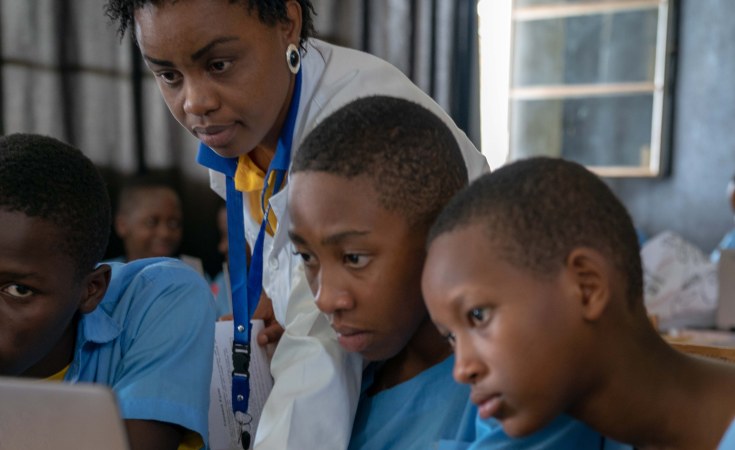Teachers are at the frontlines of education and are the single most important ingredient in young people’s learning. Investing in one teacher’s training and development can impact thousands of young people, particularly in disadvantaged communities. Resource-strapped institutions struggle to offer teachers opportunities for structured professional development and leadership. Building a cadre of highly trained teaching professionals can unlock a virtuous cycle in education development – one that can help African nations achieve their vision of becoming advanced, knowledge-based economies.
This virtuous cycle starts with high performing students entering teacher training colleges and other pre-service programs. When top students receive excellent training and become teachers, the quality of learning increases and efficiencies are gained as fewer children drop out or repeat grades. The best teachers are promoted to positions of leadership within schools so they can motivate and nurture their peers. This elevates the status of teachers, and inspires more talented students to enter the profession, continuing the virtuous cycle.
The African Union’s Agenda 2063 sets out a bold vision to fully develop the continent’s human capital as its “most precious resource” through sustained investments in education from early childhood through university. These investments are aimed at building advanced, knowledge-based economies driving prosperity across the continent.
As the key ingredient in education with the greatest impact on a child’s learning, teachers are at the core for achieving Africa’s vision. The COVID-19 pandemic has highlighted the importance of education – and teachers -- in helping young people acquire the skills they need to prepare for a fast-changing world of work. Further, teachers deliver not only skills and knowledge, but compassion, and have been a crucial element in supporting young people’s socio-emotional development through challenging times.
Rising demand for secondary education – stemming from universalization of primary education and a growing youth population – means that secondary school enrollment is expected to almost double by 2030. UNESCO estimates that this growth will create a gap of over 10 million secondary education teachers.
And, the changing nature of work in Africa necessitates transformation in secondary education systems in order to provide the skills and competencies required by trends such as digitization and automation. High on the list of these competencies are 21st century skills (such as problem solving, communication, and critical thinking) as well as STEM (science, technology, math, and engineering), digital, and entrepreneurship skills.
Yet teachers cannot impart new skills by teaching in the old ways or simply delivering knowledge on a platter. Dynamic, student-centered pedagogies that complement competency-based curricula are required. When young people are empowered to ask questions on real world problems, and then supported to find their own solutions, they develop the capacity for critical thinking. Teachers can promote 21st century skills by fostering debates in class, project-based learning, and experimentation that allow students to apply in practice the knowledge they are learning in books and lectures. The good news is that these teaching methods can be incorporated into any course or extra-curricular activity, if the teacher is properly trained and prepared to do so.
We are facing a moment in which we have a surge in demand both for additional teachers, and for teachers who are highly qualified and equipped to teach in new ways that will enable youth to thrive in a dynamic and complex world.
To ensure that accomplished students enter teacher training programs, governments can raise the standards for entry. They can also improve the status of teachers through better pay, benefits, career advancement pathways and more recognition for high performers. Or they may ease the burden on teachers by reconceiving the teaching workforce and exploring new ways to support teachers in classrooms.
Rwanda has developed one such innovative way to encourage bright students to enter teaching. In partnership with the Mastercard Foundation, Inspire, Educate, Empower (IEE), a Rwandan NGO, and the Ministry of Education created the Teaching Assistantship Program. This program invites top female secondary school graduates who excel in math and science to become teaching assistants prior to entering university. With more hands available in the classroom, teachers can implement the kind of active teaching methods needed to teach 21st century skills. The teaching assistants gain valuable work experience and self-confidence. Their students in turn benefit from positive female role models in STEM. It is a win-win-win. The experience in Rwanda has found that many talented students previously intent on business or medical careers instead pursue teaching degrees after completing the program.
Technology can play an important role. OER4Schools in Zambia is a professional learning program for teachers in grades 1-9 that integrates the use of mobile devices, digital open educational resources, and open source software to promote innovation and experimentation in the classroom. The course covers interactive teaching principles, group work, questioning, dialogue, assessment, and inquiry-based learning. It supports the Zambian curriculum and encourages active collaborative learning in math and science. Teachers raised their expectations of pupils (adapted to their knowledge levels) and used a range of interactive techniques, especially practical and group work. Students developed a deeper understanding of the subject matter, were more collaborative and actively engaged, and they were able to use digital technologies for problem solving.
When students return to schools after the disruptions and closures caused by the coronavirus pandemic, having more teachers with the right skills in place will be more important than ever. Millions of students will have lost many months of learning and will need to make up for lost time. We must ensure young people acquire the skills and competencies needed to adapt and succeed. Investing in qualified, inspired teachers is crucial to transforming education.
Let us answer the call.


